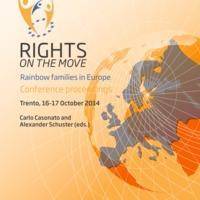Contributo pubblicato in C. Casonato, A. Schuster (ed.), Rights On The Move – Rainbow Families in Europe, Proceedings of the Conference, Trento, 16-17 October 2014, University of Trento, 2014, pp. 217-231.
Il volume è stato pubblicato nell'ambito del progetto europeo Rights on the Move .


